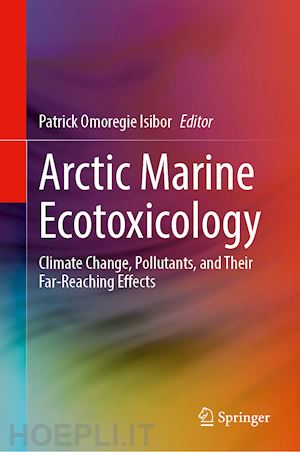

Questo prodotto usufruisce delle SPEDIZIONI GRATIS
selezionando l'opzione Corriere Veloce in fase di ordine.
Pagabile anche con Carta della cultura giovani e del merito, 18App Bonus Cultura e Carta del Docente
This book explores the fragile Arctic marine environment from the perspective of marine toxicology, shedding light on the intricate relationship between pollution, contaminants, and Arctic ecosystems. It examines the challenges of preserving this delicate habitat and the need to conserve the inherent lifeforms found there. The book introduces the unique characteristics of Arctic marine life. It delineates climate change and the effects of pollutants, analyzing their far-reaching impacts on the complex waters of Arctic marine toxicology. It also examines the regulatory frameworks required to safeguard these vulnerable ecosystems and presents case studies and ethical considerations.
Fundamentals of Arctic Marine Toxicology: Climate Change, Pollutants, and Their Far-Reaching Effects is a valuable resource for researchers, policymakers, industry professionals, and environmental stewards. Its interdisciplinary approach encompasses climate change, conservation, biology, environmental science, and toxicology. It offers a holistic understanding of the Arctic's ecological intricacies and the challenges posed by anthropogenic disturbances caused by human activities motivated by economic gain. The book serves as a guide towards a future of eco-friendly innovations that align with environmental stewardship. It envisions a world of sustainable Arctic marine ecosystems achieved through responsible and sustainable practices.
Introduction to Arctic Marine Environments.- Toxicology in Arctic Waters.- Physicochemical Properties of Contaminants in Arctic Waters.-Behavior and Fate of Contaminants in Cold Environments.- Bioaccumulation and Biomagnification in Arctic Food Webs.- Arctic Marine Organisms and Their Responses to Contaminants.- Mechanisms of Contaminant Uptake and Accumulation in Arctic Species.- Adaptations and Responses of Arctic Organisms to Contaminant Exposure.- Noise pollution of the Arctic ecosystem.- Radioactive contamination of the Arctic ecosystem.- Light pollution in the Arctic environment.- Vibrations and implications on Arctic lifeforms.- Arctic Benthic Habitat Alterations.- Impacts of Invasive Species on the Arctic environment.- Impacts of Oil and Gas Exploration.- Impact of Climate Change on Arctic Marine Toxicology.- Shifts in Arctic Marine Ecosystems and Ecological Consequences.- Interplay Between Climate Change and Contaminant Exposure in Arctic Species.- Case Studies and Research Methods in Arctic Marine Toxicology.-Regulatory Framework and Management Strategies.- Sustainable Management Strategies for Arctic Marine Environments.- Future Perspectives and Emerging Trends.- Novel Approaches and Technologies in Addressing Arctic Marine Contamination.- Ethical and Societal Considerations.- Societal Impact of Contaminants on Arctic Communities.
Patrick Omoregie Isibor, Ph.D., is a Lecturer and Researcher on Pollution Studies and Ecotoxicology in the Department of Biological Sciences at Covenant University. He received his Ph.D. and M.Sc. in Pollution Studies and Ecotoxicology from the University of Benin and a B.Sc. in Zoology from Ambrose Alli University. Dr. Isibor's research interests include ecotoxicology, hydrobiology, bioaccumulation, biosequestration, biodiversity conservation, and aquatic ecology. He is a member of the Association for Environmental Impact Assessment of Nigeria (AEIAN), the International Association of Risk and Compliance Professionals (IARCP), and the African Society for Toxicological Sciences (ASTS). He is an Editor for the African Journal of Health, Safety, and Environment and a reviewer for several reputable international journals. He is the co-editor of the books Biotechnological Approaches to Sustainable Development Goals (Springer, 2023), Environmental Nanotoxicology: Combatting the Minute Contaminants (Springer, 2024), and Nanochitosan-Based Enhancement of Fisheries and Aquaculture: Aligning with Sustainable Development Goal 14 – Life Below Water (Springer, 2024).











Il sito utilizza cookie ed altri strumenti di tracciamento che raccolgono informazioni dal dispositivo dell’utente. Oltre ai cookie tecnici ed analitici aggregati, strettamente necessari per il funzionamento di questo sito web, previo consenso dell’utente possono essere installati cookie di profilazione e marketing e cookie dei social media. Cliccando su “Accetto tutti i cookie” saranno attivate tutte le categorie di cookie. Per accettare solo deterninate categorie di cookie, cliccare invece su “Impostazioni cookie”. Chiudendo il banner o continuando a navigare saranno installati solo cookie tecnici. Per maggiori dettagli, consultare la Cookie Policy.